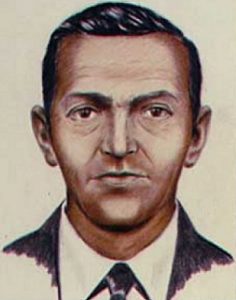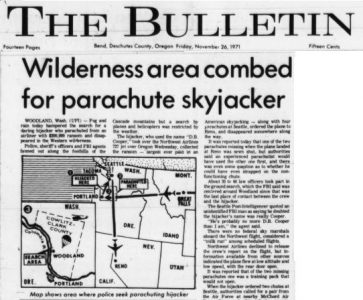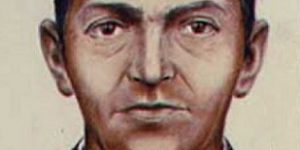The inquiry I choose to reflect on is "Finding out about DB Cooper", which I found exciting and challenging despite its apparent simplicity. After greeting the patron and she approached me with her query, I became instantly aware that I had no clue about the subject since I have had never heard the person’s name before.

I decided to start the reference interview with warm-up questions that will help me understand what the patron already knows about the character and whether she has conducted any searches on her own before seeking my assistance.
The patron mentioned she has heard about this person from a podcast episode and wanted to know more about him. My patron’s response gave me a brief idea of the character (a criminal/hijacker), has helped me better understand her actual need, and evaluate the amount of information she already knows of the topic.
During the reference interview, I continued to ask several open and closed-ended questions to allow for the patron to elaborate on the purpose for which she needs this information for, what she wanted to know about the character and the type of results and resources she was considering. She explained she wanted to find out whether the character was real or not and know if there are movies based on his legacy, I followed up with a question to inquire on whether including other fiction works (such as novels) would be useful (which she did). She also mentioned that she enjoys podcasts and would be interested in getting any relevant information in this format. I did my best to maintain eye contact, show interest, smile throughout the reference interview, nod while the patron was responding to my questions (as a sign of active listening) and still take notes of the patron’s responses as we went on with our conversation. After the reference interview was over and I started my search. The notes I took during the interview were sufficient, and I did not need to pose any follow-up questions while performing my search.
Given my different geographic background, I felt I needed to start by orienting myself on the subject since I have never heard of DB Cooper before. I started with a simple Google search to explore this name and better understand the context surrounding this character (Search keywords: DB Cooper). Wikipedia was the first results I consulted, and it provided me with the information I needed to know: The name (although not a real name) is used to refer to a real person who hijacked a plane on November 24, 1971, and then jumped from it. I double checked the information for accuracy in another article by Encyclopedia Britannica, where I was able to add another critical detail to my search: the fact that the character is also referred to as “Dan Cooper.” With the information I currently had, I decided to break down the search to:
- Formulating the search query
- Identifying my tools to:
- Search for news sources of the incident in 1971
- Search for fiction works (books or movies)
- Search for podcasts or other multimedia information sources
I formulated a modified search query using keywords, quotations, and Boolean operator ‘OR’ as follows: (“DB Cooper” OR “Dan Cooper”) and applied this search in UBC library summon. I limited results by both publication date (years 1971 to 1972) and source type (newspaper articles). This strategy did not turn out to be a successful search since it retrieved too few and irrelevant results. I then decided to use an alternative newspaper search facility; Google News–Archive, which was very helpful for it helped retrieve two old digitized newspaper clippings from local newspapers in Woodland, OR (the area where the hijacking of the plane took place) reporting the incident a few days after it happened. Most of the news sources found were from newsp apers in the US west coast (I took note of this observation and conveyed it to my patron upon reporting back to her).
apers in the US west coast (I took note of this observation and conveyed it to my patron upon reporting back to her).
 apers in the US west coast (I took note of this observation and conveyed it to my patron upon reporting back to her).
apers in the US west coast (I took note of this observation and conveyed it to my patron upon reporting back to her).I took this search back to Google to explore other relevant results and retrieved endless pieces of news dating back to more recent years (and even decades) following the original hijack and escape incident.
News dating back to 1989, 2000, 2008, etc. citing new case findings, reports (including FBI criminal record report, articles, etc.
I took notes of the FBI report but was not sure of whether the patron would find the recent news pieces relevant or not and was worried that if I included them, I would be overwhelming her. I resided to taking notes of the dates of these news updates and informed her of the availability of more recent findings on this character’s case that can be found through an internet search engine. Interestingly, I came across a documentary produced by History Channel on YouTube, however, sharing it would have been considered a likely violation of copyright laws since the producers are not the actual uploaders of the video. I did, however, suggest YouTube as a resource to view more of the related news reports and other footages which may be useful.
I later extended my search to both the Vancouver Public Library catalog and UBC library Summon, where I was able to locate one fiction novel based on the character of DB Cooper and two books. I was not able to locate the documentary movie I found (but refrained from sharing) on YouTube in either library, however, I took notes of recommending bringing it through interlibrary loan.
I am generally satisfied with my performance as a search intermediary. I believe I have created a positive and encouraging atmosphere during the reference interview process and was genuinely interested in the topic and have built a real curiosity to reveal information about the character. The answers I received from the patron during the reference interview made it clear to me that this was not an academic research or journalist research process but rather a curiosity-driven regular user inquiry. I am satisfied with the amount and relevance of information I retrieved and the total time it took me to reach a considerable amount of reliable resources which I was confident to communicate to the patron. When it was time to report my
findings to the patron, I started by informing her of the fact that DB Cooper w
as a real character and communicated the content of my search documentation sheet I compiled throughout my search process (I
used the worksheet prepared by Erin Fields UBC Liaison Librarian for the UBC ischool). The documentation included a link to the Encyclopedia Britannica article and the two news clippings reporting the incident he was involved in back in 1971.
I then explained the search query I formulated and the strategy I followed. I introduced the search tools I used and the refinements I added to the search to limit the results by date and source type. I informed her of the resources available through the local libraries (books and novel) and of the possibility of bringing the documentary movie through interlibrary loan. The patron seemed satisfied by the results she received.
In terms of challenges, in the beginning, I was worried about never hearing of the character before and that my lack of acquaintance with his identity might affect how I will be approaching the subject in my search. I channeled my anxiety by asking questions during the reference interview. I was also reluctant to rely heavily on Google and its subsidiary search tools to retrieve results that are reliable and valuable, which I resided as a result of my disappointment in my initial use of UBC library Summon search facility. Through Summon, I was surprised by the insufficient e-newspaper collections from which the UBC library’s discovery search tool was retrieving which made it impossible to rely on for this search. While I reflect on the reason for this discrepancy, I believe it goes back to the nature of this search, being more of a public library search and less of a typical inquiry you would get at an academic library. As it is the case for all academic libraries, the UBC library resources are naturally curated to serves its purpose catering to a
multidisciplinary research community.
At this stage, I knew I would need to consult the catalog of a local public library to fill this gap and thus made sure I incorporate results from the VPL’s catalog during my searching process. I was also uncomfortable to build my search on the information I started with using Wikipedia. However, I was positively surprised with the quality of the cited reference sources used within the DB Cooper’s article, and which I ended up using instead of the Wikipedia article itself. Encyclopedia Britannica came as a great help as well which allowed me to share a reliable reference source that perfectly fitted the patron’s need. I was hoping to find podcast results on the subject since this resource type was explicitly referred to by my patron as a preferred choice, but I was not exactly sure where to look for
podcasts and ended up searching in SoundCloud and did not find relevant results. After the search was over, I was curious to explore where podcasts (other than Apple iTunes to ensure technical convenience) could be located and searched. After spending some time searching, I was then able to identify search engines dedicated to searching within podcasts and found quite an extensive list of podcast episodes related to the topic and the character of DB Cooper. I wish I spent more time exploring the podcast searching during the reference process, generate and share those results with my patron.
Through this assignment (and the practice session that preceded), I have developed upon my understanding of reference service which I believe, despite universal, is profoundly shaped by the different information
landscapes. Even though, I have had a long history of working as a reference librarian in a different country, the information infrastructure over which we, as reference librarians, operate influences our service. In Canada, being exposed to different information resources (especially grey literature and government information) has made my quest for results a lot more challenging, surprising, and a continuous learning process.
References:
D.B. Cooper: Criminal. (n.d.). In Encyclopaedia Britannica. Retrieved from https://www.britannica.com/biography/D-B-Cooper (accessed on February 20, 2019)
Grossweiler, E. (1971, November 26). Hijacker Bails Out with Loot. The Free Lance-Star. Retrieved from https://news.google.com/newspapers?id=vuVNAAAAIBAJ&pg=6384%2C3320413 (accessed on February 20, 2019)
Wilderness Area Combed for Parachute Skyjacker. (1971, November 26).
The Bulletin. Retrieved from https://news.google.com/newspapers?id=bTQVAAAAIBAJ&pg=1933%2C1906592 (accessed on February 20, 2019)
The Federal Bureau of Investigation (FBI). (n.d.). D. B. Cooper. FBI Records: The Vault. Retrieved from https://vault.fbi.gov/D-B-Cooper (accessed on February 20, 2019)
Colbert, T. (Producer), & Skillman T. (Director). (2016). D.B. Cooper: Case Closed? [Motion picture]. New York, NY: History Channel.
Reid, E. (2004). D.B: A Novel (1st ed.). New York: Doubleday.
Gray, Geoffrey (2011). Skyjack: The Hunt for D.B. Cooper (1st ed.). New York: Crown Publishers.
Gunther, Max (1985). D.B. Cooper: What Really Happened. Chicago: Contemporary Books.
Fields, Erin (2019). LIBR506 Worksheet [Class handout]. Vancouver, Canada: UBC Library, University of British Columbia

Learning Significance